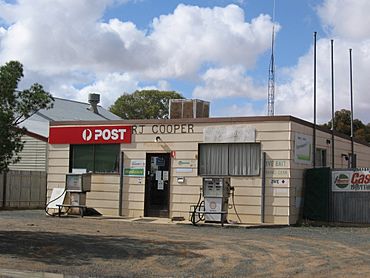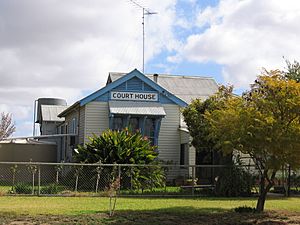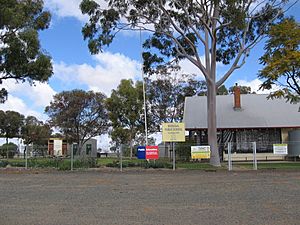Booligal facts for kids
Quick facts for kids BooligalNew South Wales |
|
|---|---|

General store
|
|
| Population | 95 (2016 census) |
| Postcode(s) | 2711 |
| Elevation | 83 m (272 ft) |
| Location | |
| LGA(s) | Hay Shire |
| County | Waljeers |
| State electorate(s) | Murray |
| Federal Division(s) | Farrer |
Booligal is a small village in the Riverina area of western New South Wales (NSW), Australia. It sits on the Cobb Highway and is located north of Hay on the Lachlan River. Booligal is part of the Hay Shire local government area.
The name Booligal comes from an Aboriginal word. It can mean either 'windy place' or 'large swamp' and 'place of flooded box trees'.
Contents
Discovering Booligal's Past
Booligal is located on the traditional lands of the Muthi Muthi and Nari Nari Aboriginal tribes.
How Booligal Started
The area where Booligal grew up was first a crossing point on the Lachlan River. This was part of the "Boolegal" sheep station. The village developed on the opposite side of the river from the station.
One of the first families to live here was Edward Roset and his family around 1856. Edward Roset built a hotel in Booligal. In 1859, Robert Whiteus started operating a punt, which was a flat-bottomed boat used to ferry people and goods across the river.
The town of Booligal was officially planned in July 1860. By December 1860, a store and two hotels were being built. The first two hotels, the Drovers' Arms Hotel and the Booligal Hotel, opened on January 31, 1861.
A post office also opened in Booligal on March 7, 1861. It closed for a while but reopened later.
Booligal's Growth: 1870 to 1900
Between 1871 and 1872, Edward Roset built a strong bridge over the Lachlan River in Booligal. This bridge was very important for the area. It was built high enough to avoid floods and had long ramps leading up to it. Roset charged a small fee to use his bridge.
By April 1877, Booligal had grown to include nineteen buildings. These included a court-house, two hotels, two stores, a blacksmith's shop, and two butchers' shops. There was also a school-house and a parsonage (a home for a minister). At this time, more than 100 people lived in Booligal.
In 1878, the telegraph line reached Booligal. This allowed people to send messages much faster.
Booligal was an important stop for transport during the late 1800s. It was on the main route connecting the Murrumbidgee and Darling rivers. Wagons carrying wool from sheep stations passed through the town. Supplies for the stations were also brought in. Booligal was a major stop for the mail and passenger coach that traveled between Hay and Wilcannia.
By 1890, Booligal had about 500 people living there.
Booligal in the 20th Century and Today
A new public bridge was built in Booligal in 1912. The current concrete bridge was built in 1984. A telephone exchange opened in Booligal on June 3, 1913, making communication even easier.
However, Booligal started to decline after a long drought around the turn of the century. Many people moved away, especially after the First World War, to the new town of Griffith.
In 1967, a special monument was built in Booligal. It honors explorer and surveyor John Oxley. The monument looks like a giant theodolite, which is a tool used for measuring angles in surveying.
Life in Booligal Today
The village of Booligal has a general store and post office. There is a cricket oval for fun games, shaded eating areas, a playground, and public toilets. The Booligal Hotel offers drinks, food, and places to stay. A primary school with one teacher recently reopened in the village.
While Booligal doesn't have its own sports teams, nearby towns like Hay and Ivanhoe have rugby league teams that play in local competitions.
Booligal in Poetry
The famous Australian poet A. B. 'Banjo' Paterson (1864–1941) wrote a poem about the area called Hay and Hell and Booligal. The poem talks about the tough conditions in the region, especially during a drought.
Just now there is a howling drought
That pretty near has starved us out—
It never seems to rain at all;
But, if there should come any rain,
You couldn’t cross the black-soil plain—
You’d have to stop in Booligal."
.....
"We’d have to stop!" With bated breath
We prayed that both in life and death
Our fate in other lines might fall:
"Oh, send us to our just reward
In Hay or Hell, but, gracious Lord,
Deliver us from Booligal!
 | Sharif Bey |
 | Hale Woodruff |
 | Richmond Barthé |
 | Purvis Young |




